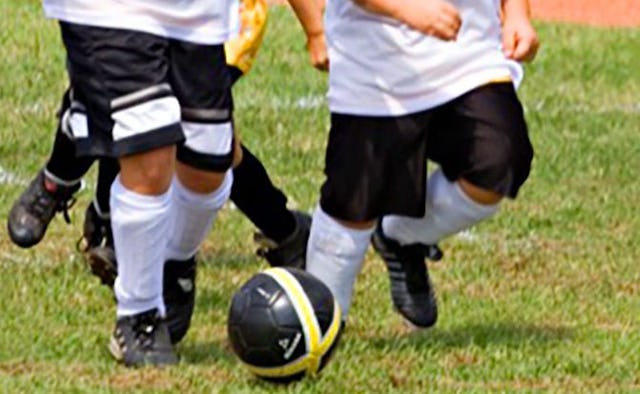It's OK to Be a Pushy Parent. Sometimes.

A recent New York Times column takes issue with the notion that kids must find a “passion,” and, in addition to placing a fair share of responsibility for this on the college admissions process, gently wags a finger at pushy parents. Pushy parents are the moms and dads who pick an activity—playing the saxophone or kicking a soccer ball—and tell their kids, “You’re going to be good at this,” even if Junior doesn’t want to be the next Kenny G or Mia Hamm.
That’s right, parents are screwing up again.
The writer of the Times column, Lisa Heffernan (a contributor to The Mid), says that pushy parents are motivated to such madness by the college application process. Colleges used to look for well-rounded kids—kids who dabbled across a range of activities: academics, sports, scouting, music, volunteering, etc.
Now, colleges want students who have committed to their lifelong passion by middle school.
When I was in middle school, my passion was hiding out in libraries and reading the entire Black Stallion series. In high school, my passion was hiding out in my room and listening to T. Rex while drinking warm cans of beer.
I was a late bloomer when it came to finding a sensible, lifelong passion. I didn’t begin writing until I was in my mid-20s. My other great passion, figure skating, didn’t blossom until my 40s.
I’ll agree with Heffernan that it’s a bad, bad idea for parents to choose a passion for their child.
Now here comes my big “but.”
But…
Even if some parents are too pushy, I’m going to suggest that, at times, it’s OK to give a little shove.
You’re not getting a sports scholarship, and that’s OK.
I’m not signing up my kid for Little League because I think he’s the next Derek Jeter. I’m signing up my kid to play baseball—or soccer or field hockey—because exercise is a non-negotiable in our house.
Sure, kids can ride bikes or climb trees for exercise. But grownups know from experience that these solo sports—like triathlons and gym memberships—require a high threshold for overcoming inertia.
When a kid joins the soccer team, she’s responsible to the team. It’s like she’s signing a binding contract for getting her butt out of the house and showing up for sweating.
No tween is an island.
You want to try scouting? How about marching band? I hear the Key Club needs volunteers to work at a local shelter next week.
Listen, kid, no one likes group work. But learning how to play nice with others is a skill you’ll need in both your work and personal life. Stop thinking of joining a group as a college resume line, and instead, consider it a lifeline.
And volunteering to help others is another non-negotiable.
Consider the banjo.
I don’t care if you never play at Carnegie Hall. I’m not expecting a million-view YouTube video of you singing a cover of Ariana Grande singing a tribute to Celine Dion’s version of “My Heart Will Go On.”
But if you can play an instrument or sing a song, it’s like having another voice to express yourself. When you learn to “speak” music, even a few phrases, you can understand people from a multitude of cultures in spite of differences in verbal language.
And yes, chicks love guitar players, so there’s that.
“Hard work beats talent when talent doesn’t work hard.”
We all know the kid in the gifted class who flunked Algebra because she was “too smart” to study.
I don’t expect straight As, but it’s OK to push kids to know what it feels like to work with a bead of sweat on their brows. Later, if they choose not to work hard, at least they’ll know that not achieving their personal best is, indeed, a choice, not some indisputable fact about their potential.
I’ll let you know when you can quit.
If a child joins an activity that is truly dangerous, or if the mentor adults or other children are abusive, then yes, my child can quit, pronto.
Otherwise, kid, you need to give any new activity a solid go. Before you say, “I’m not good at this, I give up,” work with a teacher or coach to set a reasonable beginner’s goal. Then, try your best to master that goal.
I told my middle child she could quit violin after she learned to play a certain song she had been fretting over. My daughter worked hard to learn the song. She threw the bow at me twice and at the cat once. Eventually, she learned to play the song, felt good about the accomplishment, and promptly never picked up the violin again.
Now she plays clarinet, which she loves. Yes, there are still tough, frustrating moments learning new songs. But she’s had that experience of working through a few sucky practices to hit the sweet notes.
So, don’t let anyone tell you that all pushy parents are overachievers-by-proxy.
Some of us parents are being sensible with our shoving.
This article was originally published on